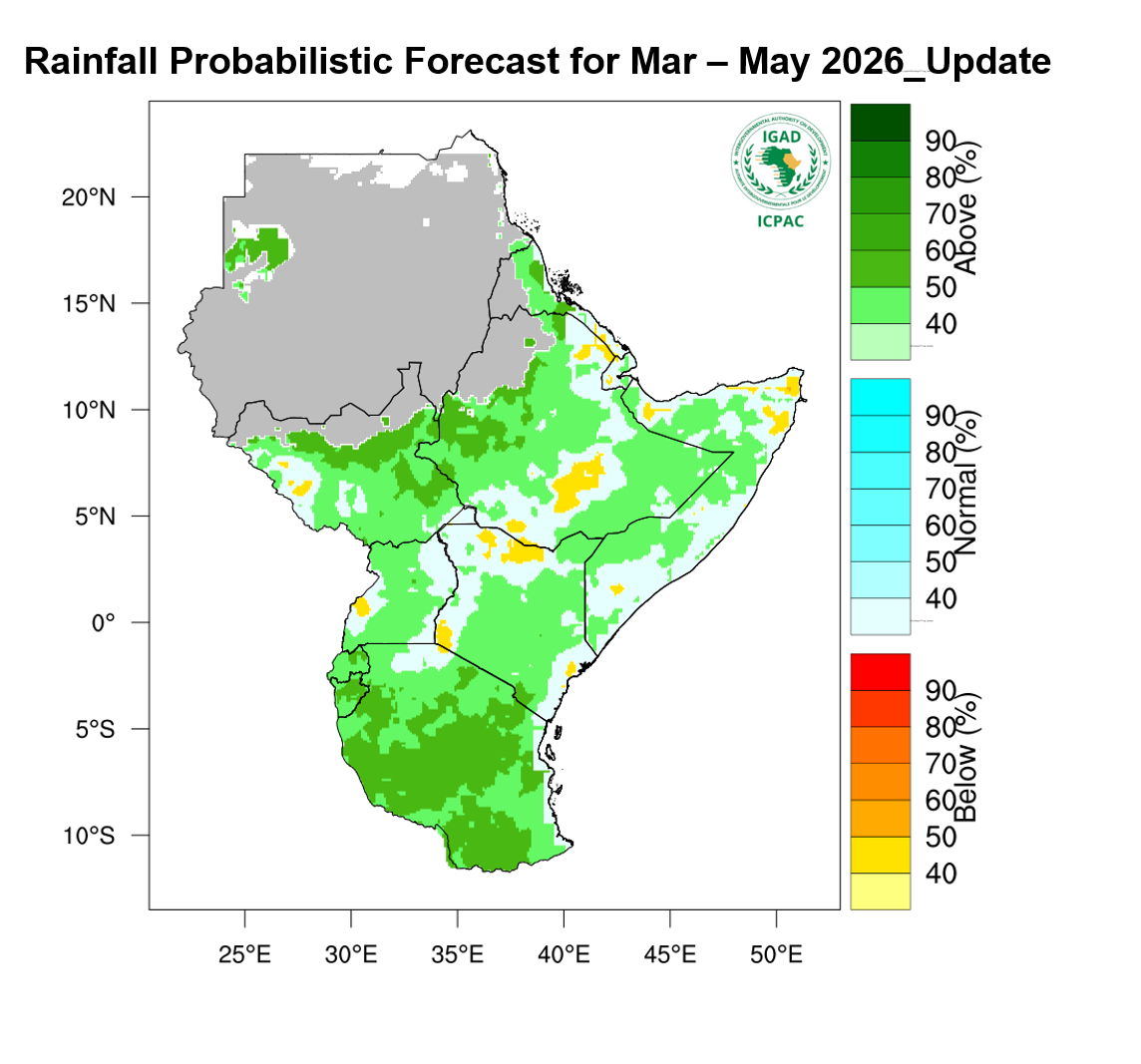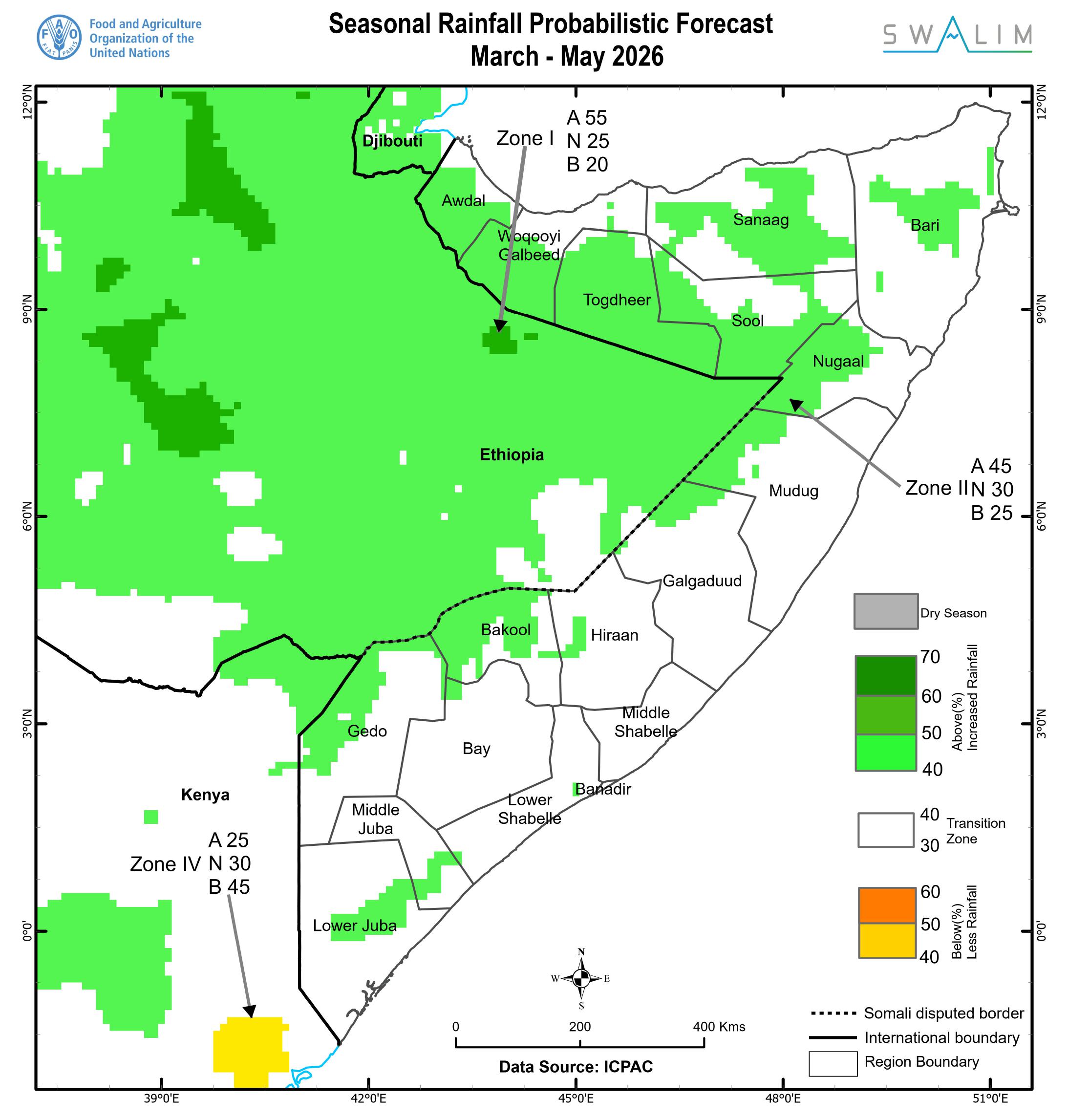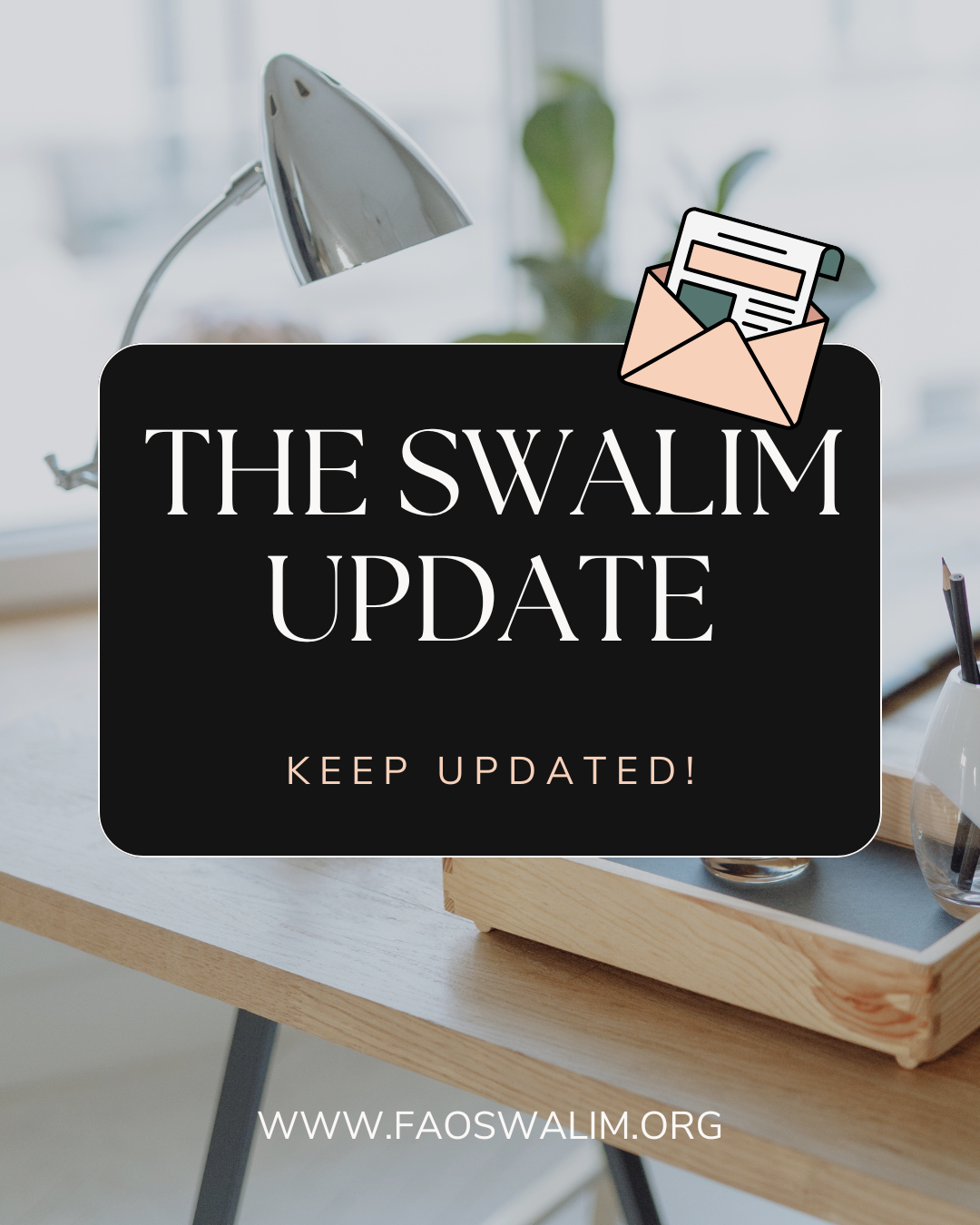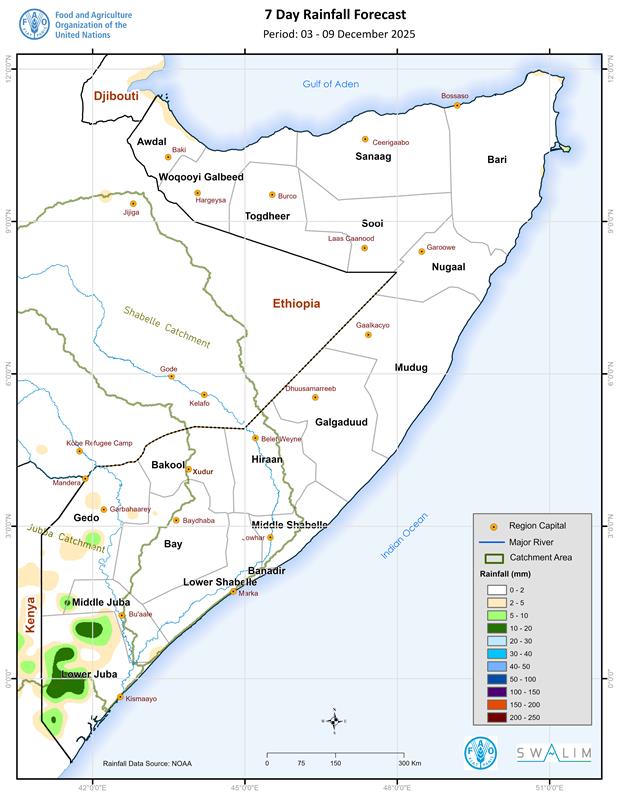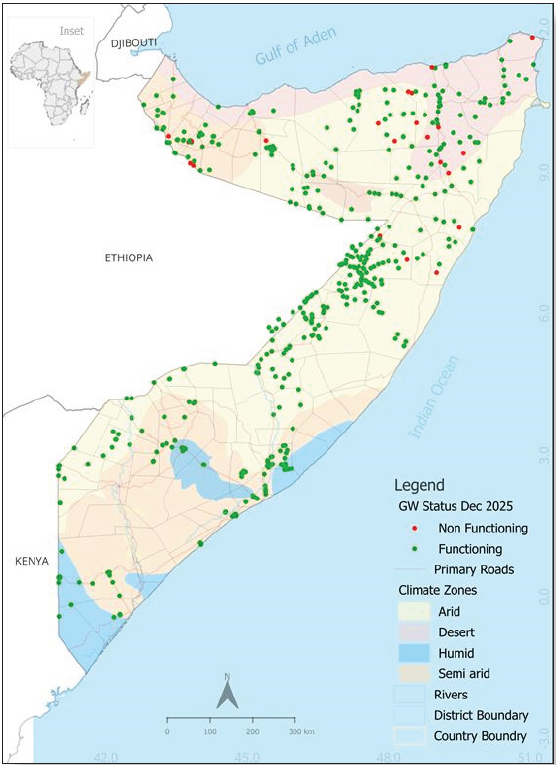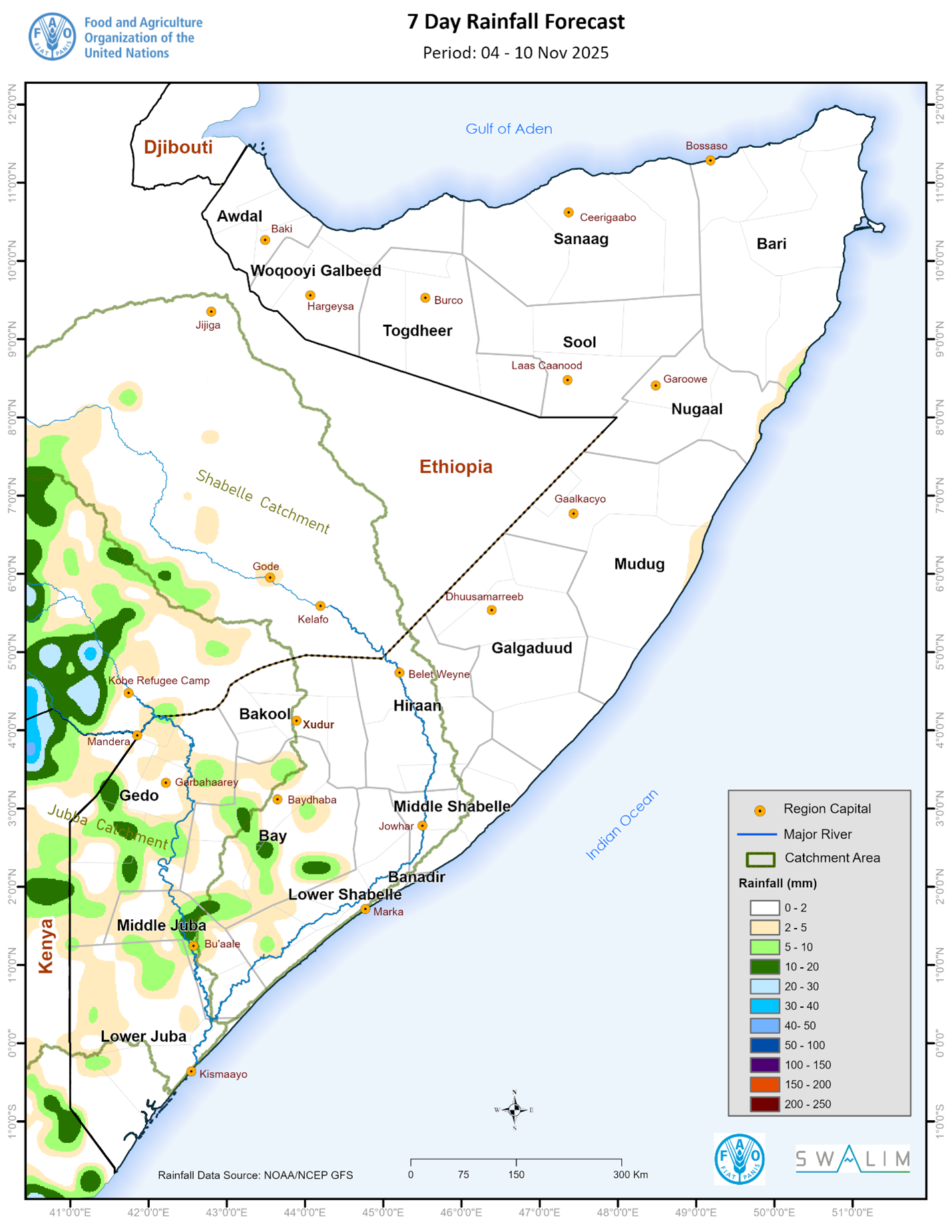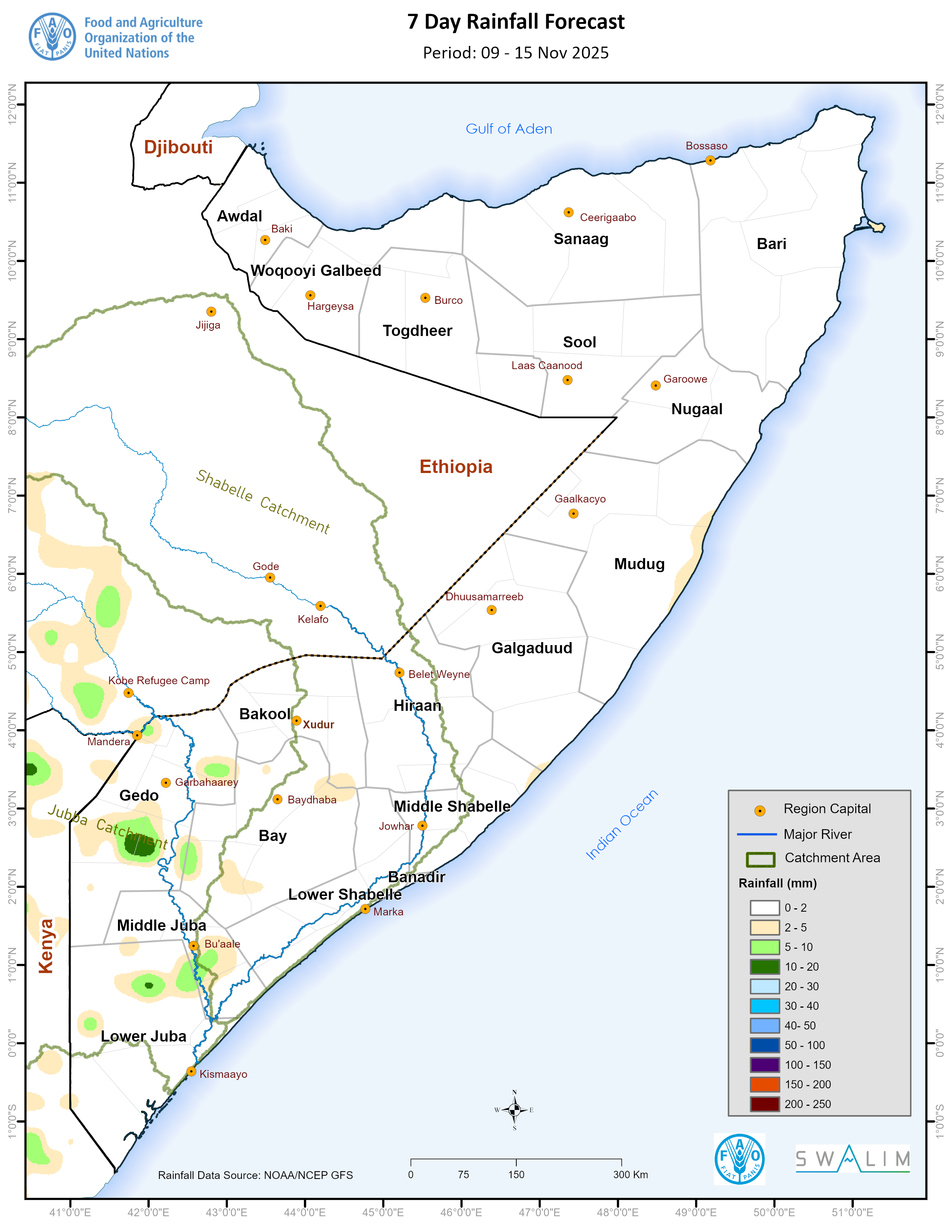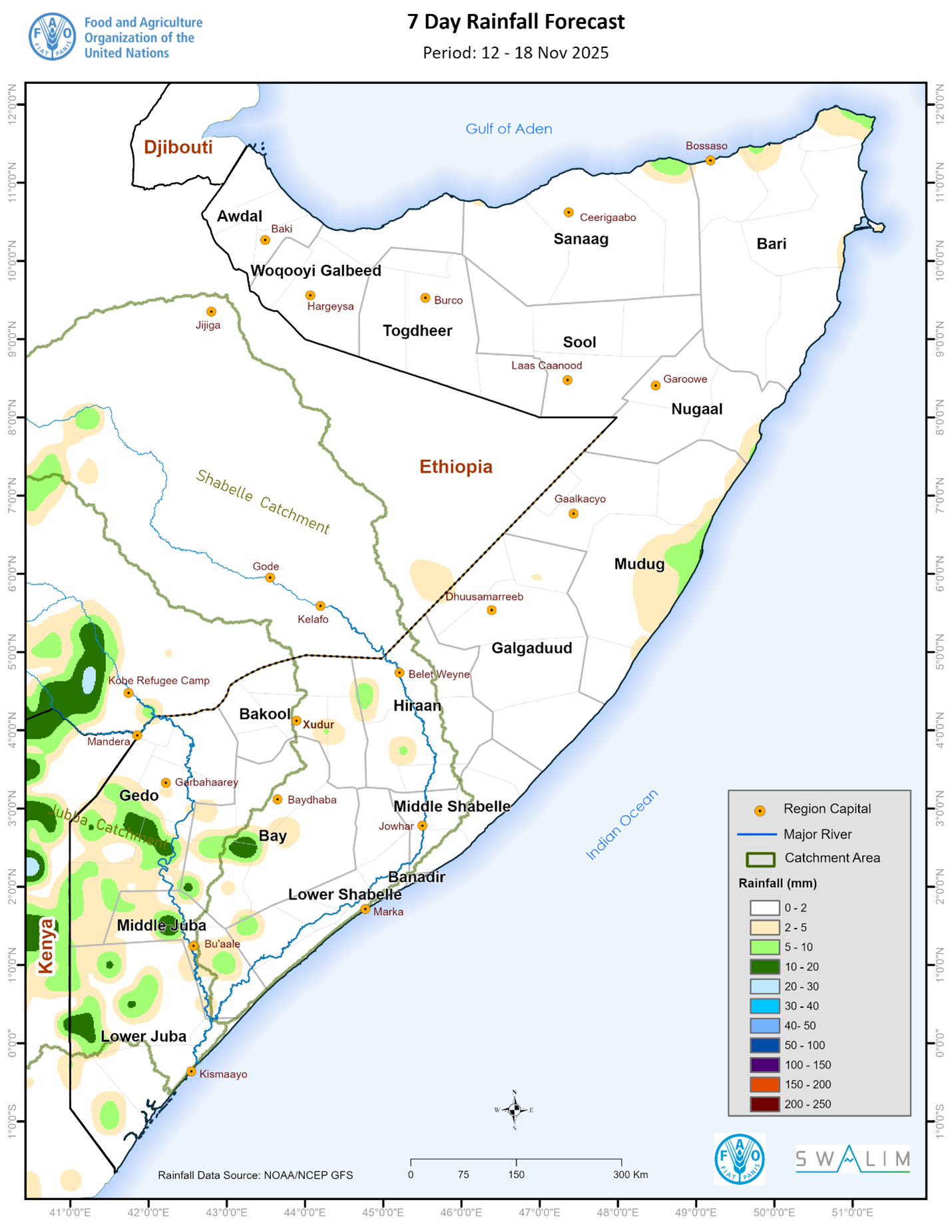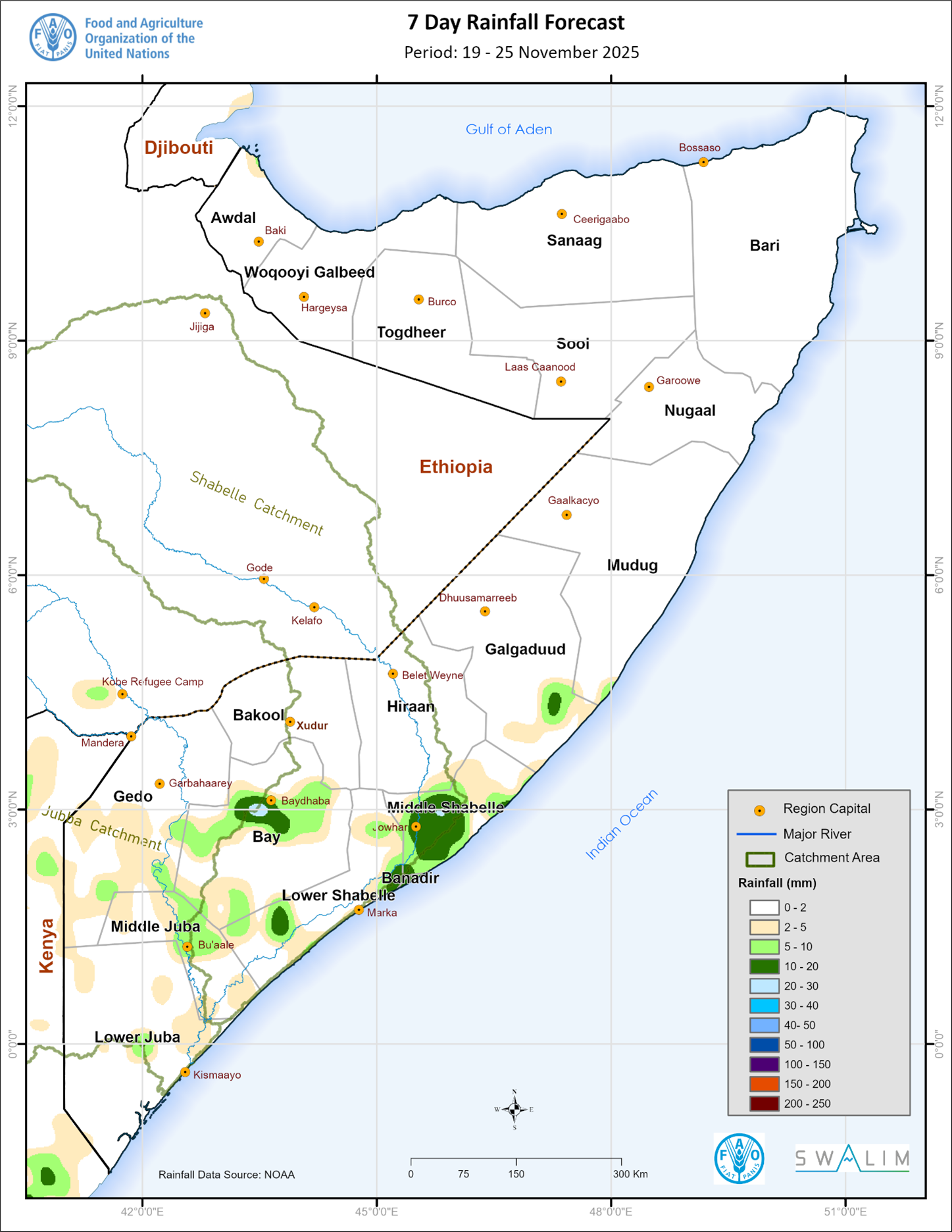Library Catalog
Latest Documents and Publications listed. Use search terms in the box below to find what you need
Somalia GU 2026 Seasonal Climate Outlook Update - Issued 03 March 2026
This is an update to the Gu 2026 Climate Outlook Bulletin issued on 7 February 2026. It incorporates National Climate Outlook Forum (NCOF) outcomes, latest IGAD Climate Prediction and Application Centre (ICPAC) rainfall forecast, Post Deyr IPC Analyses released on 24 February 2026, and community feedback received in mid-February 2026
Updated outlook indicates improved rainfall prospects in parts of southern, central and northern Somalia, but localized below-normal risks persist in Bari and parts of Bay and Woqooyi Galbeed, with high spatial variability
Above-normal temperatures are forecast across most of the country; however, normal to below-normal temperatures are expected over Gebiley district and southern Hargeisa (Woqooyi Galbeed), parts of Owdweyne (Togdheer), and central highland areas of Ceerigaabo (Sanaag). While heat will intensify drought impacts nationally, these localized cooler conditions may moderate evapotranspiration and slightly ease drought stress in those highland areas
Recent food security analyses signal a marked deterioration in household conditions during Feb–Mar 2026, reflecting cumulative drought impacts, water shortages, livestock losses, and weakened coping capacity
Even under a near-average Gu scenario (Apr–Jun), only partial improvement is anticipated, indicating that rainfall gains may not translate into significant recovery
Gu 2026 should therefore be treated as a stabilization window—not a recovery season, requiring sustained drought response, flexible anticipatory action, and close monitoring
Publication Type:
Rainfall Outlook
Publication Date:
Author:
Corporate Author:
Somalia Gu 2026 Climate Outlook - Issued on 7 February 2026
Rains are most likely to begin over Gedo in the third week
of April, progressing eastwards to Lower and Middle Juba,
Bay, Bakool, Lower and Middle Shabelle, Hiraan, Galgaduud,
Awdal, Woqooyi Galbeed, and Sool by the fourth week of
April (Figure 3). Mudug, Nugaal, and Sanaag are likely to
follow in the first week of May, and Bari in the second week
of May.
Although isolated rainfall may occur as early as late March,
operational onset is expected later in April.
There are chances of delayed onset in parts of Jubaland,
Nugaal, and Woqooyi Galbeed, while earlier onset is possible
in central regions. Onset timing remains highly uncertain
over Bari, Sool, and Sanaag.
Publication Type:
Rainfall Outlook
Publication Date:
Author:
Corporate Author:
SWALIM Update - Issued 07 January 2026
The Somalia Water and Land Information Management (SWALIM) project, implemented by FAO, provides critical water and land resource information to support sustainable development, disaster preparedness, and humanitarian response in Somalia. This newsletter highlights our latest activities, data products, and technical updates from drought and flood monitoring to groundwater assessments and capacity building initiatives. We aim to keep our partners informed and strengthen evidence-based decision-making across Somalia.
Publication Type:
Newsletter
Publication Date:
Author:
Corporate Author:
Somalia Rainfall Forecast – Issued 3 December 2025
Based on NOAA-NCEP GFS, dry conditions are expected to prevail in most parts of the country with chances of very light rains in some parts of Jubaland (Figure 1). Dry conditions are also expected over the entire Shabelle River catchment. Light isolated rains are expected over the Juba River catchment within and outside Somalia.
Publication Type:
Rainfall Forecast
Publication Date:
Author:
Corporate Author:
Early Warning Alert on Drought in Somalia - Issued 8 December 2025
According to UNHCR, severe drought has led to the displacement of 156,000 people from Toghdeer, Sool and Sanaag regions in search of water and pasture. An additional 29,142 people have also been displaced across Bari, Mudug, Nugaal and Sanaaag regions due to drought.
Publication Type:
Drought watch
Publication Date:
Author:
Corporate Author:
Somalia Groundwater Status Update - Issued 23 December 2025
Groundwater remains Somalia’s most critical and dependable water source, sustaining urban and rural populations, pastoral livelihoods, and productive sectors especially as surface water availability continues to decline during the ongoing drought. SWALIM has finalized the December 2025 Groundwater Status Update which indicates that aquifer conditions across the country are strongly driven by seasonal rainfall and are increasingly stressed by recurrent drought, high temperatures, and rising abstraction. Significant groundwater declines were recorded in parts of Somaliland and Puntland following poor Deyr 2025 rains, while central and southern regions generally maintained more stable conditions. Groundwater quality trends closely mirrored water-level changes, with higher salinity during periods of depletion and improvements following seasonal recharge, underscoring the close link between climate variability, aquifer dynamics, and water quality
Despite these pressures, weekly monitoring data indicates that most strategic boreholes remain functional, particularly in south-central Somalia, ensuring continued access to water during the early Jilaal dry season. However, localized mechanical failures mainly related to pumps, power supply, and riser pipes have concentrated abstraction on fewer water points in Puntland and Somaliland, accelerating aquifer stress and contributing to rising water prices in some regions.
Persistently low river levels along the Shabelle and Juba rivers have further increased dependence on groundwater for domestic use, irrigation, and water trucking. With hot and dry Jilaal conditions expected to persist and uncertainty surrounding the Gu 2026 rains, sustained groundwater monitoring, rapid rehabilitation of non-functioning boreholes, and strengthened demand management remain essential to mitigate escalating water stress and support informed humanitarian and development responses
Publication Type:
Newsletter
Publication Date:
Author:
Corporate Author:
Somalia Rainfall Forecast – Issued 4 November 2025
Based on climatology, the month of November marks the peak of Deyr rains. However, according to NOAA-NCEP GFS, dry conditions are expected to prevail in most parts of the country, particularly northern and central parts during the coming week (Figure 1). Light rains are likely over few isolated areas in Bay, Gedo, Middle Juba and Lower Juba regions, and Sablaale district in Lower Shabelle region. The present status of the Madden Julian Oscillation (MJO) index is strong but out-of-phase and is therefore not likely to favor any significant rain during the forecast period.
Publication Type:
Rainfall Forecast
Publication Date:
Author:
Corporate Author:
Update on the Juba and Shabelle River Levels - Issued 9 November 2025
Based on climatology, the first week of November represents the climax of the Deyr rainfall season. So far into the season, Deyr rains have been below normal across most parts of the country. Given that the Madden Julian Oscillation (MJO) index (Figure 5) is out-of-phase, and as confirmed by the NOAA GFS (Figure 4), dry conditions are forecast over Somalia including the entire Juba and Shabelle River catchments in the coming week. The Deyr season may actually come to an end in the coming two weeks ushering in the hot and dry Jilaal season.
Based on the available observed and forecast data, the likelihood of flooding along both Juba and Shabelle Rivers remain low.
Publication Type:
Flood Alert
Publication Date:
Author:
Corporate Author:
Somalia Rainfall Forecast – Issued 13 November 2025
According to NOAA-NCEP GFS, dry conditions are expected to prevail in most parts of the country, particularly northern and central parts during the third week of November (Figure 2). Light rains are likely over few isolated areas in Lower Juba, Middle Juba, Gedo, and Bay regions, and coastal parts of the following areas: Hobyo district in Mudug region, Caluul and Bosasso districts in Bari region, and Laasqoraay in Sanaag region. The Madden Julian Oscillation (MJO) index is presently strong but out-of-phase and is therefore not likely to favor any significant rain during the forecast period.
Publication Type:
Rainfall Forecast
Publication Date:
Author:
Corporate Author:
Somalia Rainfall Forecast – Issued 19 November 2025
According to NOAA-NCEP GFS, light rains are likely over some areas in the south with dry conditions expected to prevail in most other parts of the country, particularly Somaliland and Puntland (Figure 2). The rains in the south may be of moderate intensity over isolated areas in Bay, Lower Shabelle, Banadir, and Middle Shabelle regions, and over the coastal parts of both Galgaduud and Mudug. These light to moderate rain is likely to be observed between 22 and 24 November 2025.
Publication Type:
Rainfall Forecast
Publication Date:
Author:
Corporate Author:
Pages
 RSS feed [compliant with the Agris AP] |
RSS feed [compliant with the Agris AP] |  Agris AP XML
Agris AP XML


